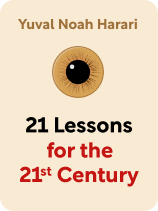

This article is an excerpt from the Shortform book guide to "21 Lessons for the 21st Century" by Yuval Noah Harari. Shortform has the world's best summaries and analyses of books you should be reading.
Like this article? Sign up for a free trial here .
What is the connection between religion and morality? Is the belief in God necessary for morality and social order?
Holy books such as the Bible and Quran try to draw the connection between morality and religion by conflating the cosmic God and the lawgiver God. But humans don’t need divine law or the threat of hell in order to act morally. Morality is baked into the DNA of humans and all social animals.
Keep reading for more about morality and religion.
On Relation Between Morality and Religion
Just as people wrongly credit their cultures for contributing to society and maintaining social order, people mistakenly conflate morality and religion. In reality, humans are hard-wired to act morally, and religion has worked both for and against this cause.
When people talk about God, they can be referring to one of two versions:
- The cosmic God is grand and mysterious, and humans know nothing concrete about Him. He is the answer to all unanswered questions: What is the meaning of life? What shaped the world? This is the philosophers’ God, which embodies human ignorance and speculation.
- The lawgiver God is strict and judgmental, and humans know plenty about Him and His preferences. He has specific rules about what people can wear, eat, drink, and do. This is the God of homophobes, jihadists, and Crusaders.
Religious people talk about both gods as one—declaring that He is a mysterious force, but also that He has very clear rules about gay marriage. Implying that the two gods are one and the same is what conflates morality and religion. However, these two views of God are contradictory. If God is an enigma, how could he have also delivered so many specific and minute ordinances about the ways that humans conduct themselves?
Holy books such as the Bible and Quran try to draw the connection between morality and religion by saying that the cosmic God and the lawgiver God are one and the same, but these texts smack of human interpretation. It’s not logical that God Himself—whichever God that may be—wrote these texts not only to proclaim the principles of a moral life, but also to make decrees that were specific to the time and place when the texts were written. Morality and religion became so intertwined because humans wrote these texts in order to maintain social order and legitimize cultural norms.
While the rules of the lawgiver God may have successfully kept peace and social order in many eras and cultures, they have also been the source of much violence and discrimination. People have committed countless atrocities in the name of God. By contrast, secular laws have achieved the same social order as religious laws, but they have not inspired the same level of self-righteous violence.
As social animals, humans are motivated to do what’s best for their communities, because relationships play a large role in determining human happiness. Additionally, humans are motivated to be good to people outside of their immediate communities for reasons that are separate from religion, including:
- People fear retaliation—in other words, don’t harm others, because you wouldn’t want them to harm you in return.
- Societal structures like commerce only work when there’s trust between strangers (in this case, the merchant and the consumer).
- Violent and harmful acts start with the aggressor’s violent and harmful thoughts. A peaceful, happy person doesn’t steal or kill, so most people aren’t naturally inclined to commit serious harmful acts.
Secularism Upholds a Code of Ethics
Since belief in God is not necessary for morality, let’s examine the merits of secularism. Religion demands faith and commitment to one God and one set of beliefs, which necessarily closes followers off to other ideas. By contrast, secular people consider wisdom and morality to be common human traits, regardless of faith or background, which makes secular people more accepting of different beliefs and identities. Instead of committing to a set of beliefs, secular people adhere to a core set of ethics, which includes:
- Truth: The most important secular value is truth that’s based on evidence and observation, as opposed to a truth dictated by faith. Whereas religious followers find their truth from faith leaders and in holy texts, secular people don’t look to any single source as the primary holder of truth—instead, they seek pieces of truth wherever it exists. Although science and religion aren’t mutually exclusive, the secular attitude toward finding truth through evidence and observation is the foundation of scientific discovery.
- Compassion: Secular people value compassion for everyone, regardless of their membership to any religion or group. Whereas religious followers preach compassion as a form of honoring and obeying God’s wishes, secular people value compassion because of a general appreciation for human suffering. As a result, the secular form of compassion remains stable, while faith-based compassion can waver if it conflicts with God’s desire to shun non-believers or punish sinners.
- Equality: The secular values of truth and compassion produce a strong commitment to equality. Since secular people approach issues based on truth and information, and they recognize suffering as suffering—no matter who’s experiencing it—they give the same weight to the rights, experiences, and grievances of everyone equally.
- Freedom: Freedom is essential to pursuing truth, spreading compassion, and achieving equality. Secular people believe that individuals should be free to question, doubt, explore, and reach their own conclusions. For this reason, they don’t appoint any leader, text, or institution as the arbiter of true and false, right and wrong.
- Courage to admit ignorance: The courage to admit ignorance and mistakes is absolutely essential to the secular commitment to truth: If you don’t acknowledge what you don’t know, then you’ll never seek more information. By contrast, religion often instills a fear of the unknown and deters followers from admitting any questions or holes in the information set forth by the faith. When people fear that their truth could collapse, they’re much more likely to be violent and aggressive to perceived threats to their beliefs than people who are open to learning and evolving.
- Responsibility: Responsibility is foundational to secularism because, in the absence of an all-powerful God to right the world’s wrongs, that duty falls on people. For this reason, secular people take great pride in humankind’s accomplishments, from resolving social issues to making scientific discoveries. By the same token, secular people can’t blame war, disease, or climate change on God’s will—rather, they must take accountability and ask how they can help resolve the problem.
Secular people recognize that these values are innate in all humans, so they can appreciate when religions uphold the same values. As such, secular societies embrace religious people as long as the faithful follow secular values above religious codes. For example, although Judaism proclaims that Jews are the chosen people—and, thus, superior to gentiles—Jews are expected to respect everyone’s equality in a secular society. However, secular society does not oblige religious people to forego their beliefs or ceremonies. Secular people’s appreciation for freedom extends to everyone’s right to worship according to her individual beliefs.

———End of Preview———
Like what you just read? Read the rest of the world's best book summary and analysis of Yuval Noah Harari's "21 Lessons for the 21st Century" at Shortform .
Here's what you'll find in our full 21 Lessons for the 21st Century summary :
- What the unique challenges of the 21st century are and will be
- Why religion can't solve these 21st-century challenges
- How algorithms like Netflix recommendations are teaching you not to trust yourself






